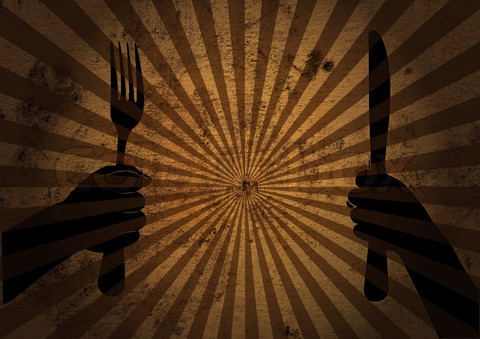by Anya Regelin
Let’s get this out of the way: I cook professionally and I don’t taste my food, and I haven’t, by choice, in years. Before you start thinking that I cannot possibly be a real chef, I will tell you that I have been cooking professionally for close to thirteen years, first in restaurants, and for the past seven, privately.
So how do I do this, and more importantly why do I do this? Not tasting started as a little one-time experiment “just to see what would happen.” The practice has stuck, and now, for the most part, I have not tasted anything that I have made for my clients in over three years. Hand formed chocolate tarts, homemade artichoke ravioli, cured Hamachi with preserved lemon, truffle infused custards? Nope. Chicken Soup? Occasionally. Chicken soup can be tricky.
Back when I went to culinary school, I was taught that a good cook tasted everything — all of the time. Not doing so was akin to a writer not running spell check. (I was also taught that in the culinary-world-food-chain, private chefs were one step above caterers, essentially not cut out to hack it with the big boys, the guys who toiled night after night in professional restaurant kitchens, preferably with multiple stars after their names. I later changed my opinion about this as well.)
A little over three years ago, I was in the middle of frantically preparing a four-course dinner party for fifteen. The menu was ambitious and my clients were ultra-rich and demanded ultra-fancy food that would wow their dinner guests. These clients were also ultra-orthodox Jews and all of the food was prepared under strict Kosher guidelines, a restriction that I was incredibly new to. I was constantly manipulating recipes while crossing my fingers in the hopes that things would work out as planned. I dipped and licked out of nervousness, constantly questioning if what I was cooking was any good and if my difficult clients would ever be pleased.
Private cheffing is not like restaurant cooking. A restaurant cook typically works on a station doing one of ten things over and over again. If the first batch of brussel sprouts aren’t perfectly caramelized, you might get yelled at a little bit, but don’t worry, you have forty more orders over the course of the night to make them right. Ultimately, it’s all about repetition. A private chef, however, rarely gets more than one chance to prepare a single dish.
Having worked in the type of restaurants where it is all about producing perfection on a plate, I was having a difficult time relaxing as a private chef and trusting the cooking process. Even while working alone, I demanded the same intricate, highly stylized food that usually took a small army cooks to produce. My energy in the kitchen was charged, nervous, and frenetic, and it was affecting the quality of my food. I found myself tasting everything — constantly. Was it OK? Was there enough salt? More salt. Oh no, too much salt! Add lemon. Oh no, too much lemon! I licked, smacked, and dipped myself crazy. I was so consumed with how perfect the finished plate should look and taste that I was losing my head in the process.
That day, in the middle of preparing that intricate dinner for fifteen, I decided to change the way that I worked. Over the next few hours I paid careful attention to every step of every dish. I resisted the urge to taste to just “see how I was doing.” I drizzled olive oil and looked for color and texture. I inhaled deeply to catch subtle aromas and added a bunch of thyme. I was immediately unable to multitask. A calm fell on the kitchen.
Right before the dinner party was about to start, I lined up all of my pots and armed with a teaspoon, I sampled each one. Maybe a sauce needed a little salt. Maybe. But who am I to say what the right amount of salt is? Whenever I go to a restaurant, I’m always the first to ask for the saltshaker. (In fact, it is one of my pet peeves when a restaurant makes you ask for salt, only to be met with an eye roll from a hipster waiter who just learned how to pronounce foie gras stuffed angolotti five minutes before his shift started.)
I do realize that I am no food genius, but I started to think, Beethoven went deaf at the height of his music career, yet he continued to compose music because he trusted that what he heard in his head was the same that his audience appreciated. Not that I am comparing myself to Beethoven, but what I had was a trust issue. My obsession with the perfection of my final product was overwhelming the process of cooking in the first place. And what is cooking, after all, but a series of creative, chemical, processes? When I stopped using my sense of taste to be the first and foremost judge of “good,” my food actually got better. My dishes were more dynamic and colorful; simultaneously simple yet ambitious.
Yes, but what did the meal taste like? I have no idea. But at that dinner party, the plates came back clean.
Anya Regelin is the Deputy-Editor of The Inquisitive Eater. “Perfection on the Plate” is the first installment of The Tasteless Chef, a regular column chronicling her exploits and misadventures as a freelance private chef.


1 Comment
When you aren’t using your sense of taste, your other senses will certainly rise to the occasion. What an interesting and thoughtful experiment! Risky? Sure. But worth the result of a more relaxing work environment and a heightened end result! Looking forward to hearing more…